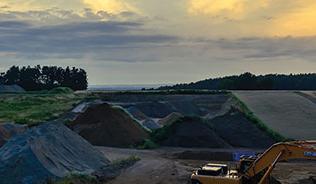Listen to more episodes of 'From the Archive' on the series hub.
This article is taken from 'Transforming the planet: Our vision for the future of environmental science', which sets out a vision for the role of environmental science in facilitating the transition to a sustainable society.
Throughout the IES’s Future of ES23 horizon scanning and foresight project, the IES considered the future of the environmental workforce and jobs in the environmental field. ‘Transforming the planet’ brings together those conversations with thematic conversations on megatrends, the future of science, and the regulatory landscape.
Read our full vision in Transforming the planet.
From specialisms to systems - Challenging disciplinary norms
Environmental science, by its nature, is based upon an understanding and management of systems. It is no surprise, therefore, that fundamental to discussions on the future of environmental science is the need for embedding systems thinking principles. Although interdisciplinarity and systems thinking are currently ‘in vogue’ in scientific and political rhetoric, in practice there seems to still be a level of confusion and reticence about how it can be applied.
To build a positive future of environmental science it is crucial that tools are developed to embed systems thinking and build bridges for truly interdisciplinary practice. Frameworks will be needed to support interdisciplinary working as well as novel approaches to knowledge sharing like best practice communities and knowledge networks, case studies of successful projects using interdisciplinarity, upskilling in science communication and systems literacy, and forums to connect disciplines. Professionals also need to be open to new approaches and ways of working, whilst maintaining the high standards and robust scientific methods that are currently used. This aligns with that broader need for shared understandings which unite the public, policy makers and integrate multicultural perspectives and scientific literacy.
There will always be a need for subject specialists within the environmental sciences, but environmental scientists who act as knowledge brokers and boundary spanners are also needed. These scientists will play an important role in facilitating the sharing of environmental science knowledge between specialists and supporting the creation and management of interdisciplinary teams. Defining what constitutes a ‘green job’ will also be part of this and will shape the sector to come, as it is likely this definition will broaden as sustainability becomes embedded across industries and sectors. There should be a strong focus on skills in interdisciplinary working, including enabling skills such as communication, collaboration and influencing.
Systems literacy will be needed, not just among the scientific community, but more broadly among policy makers and the public. There is a role for environmental science and scientists in supporting raising the public’s consciousness and understanding in this area and supporting evidence-led behaviour change and solutions. This will go beyond just needing specific tools or techniques for systems approaches, but also a deep understanding of the natural and social systems themselves.
It is also important to note the blurred lines between science and activism in the environmental sector and how this may impact the interface between the public, science and policy makers and thus the role of environmental scientists as change agents. To be successful, environmental scientists will need a good understanding of the political and social landscape they are operating in, and tools to navigate it effectively.
Key to this will be considering how they can translate scientific evidence into useful formats for different stakeholders. Developing a common language and values framework are an important aspect of supporting interdisciplinary teams and bridging understanding across specialisms. Practicing systems thinking through a practical, rather than a purely theoretical, framing can also be effective at supporting shared understanding and considering how systems thinking can be used in the day-to-day work of different stakeholders. Dedicated communities of practice and knowledge networks can facilitate collaboration and knowledge-sharing between disciplines and provide a useful forum for sharing case study examples of what works (and importantly what doesn’t) in different contexts.
The role of the professions in delivering a sustainable future
There is currently no profession that fully embraces sustainability due to its boundary-spanning nature. In order to support transformative change to a sustainable society, embedding sustainability, and by extension interdisciplinarity, throughout the professions will be key.
Professional and licensing bodies need to embrace sustainability and consider how they can embed sustainability into their CPD, competencies and best practice. This can be difficult; professional bodies are often constrained by their objects and discipline of focus. Collaboration and partnership across professional bodies will therefore be key for this to tap into the relevant expertise and to ensure systemic, rather than siloed change. These partnerships must be built on an ethos of mutual benefit and transparency and provide space for collaborative development of materials to support their respective members and the development of professional practice for sustainable development.
Professional bodies must also utilise their unique position in society to convene key stakeholders and drive change in professional standards and competencies, with the aim to support their members not just as professionals, but as change agents in society. Vehicles for collaboration between professional bodies should be championed, such as Licensing Bodies and specific forums like the Professional Bodies Climate Action Charter which can assist in the development of collaborative approaches and resources.
Professional bodies should also utilise their links with education institutions to drive change in best practice regarding sustainability upskilling within education settings and providing opportunities for developing skills in interdisciplinary working and systems thinking. There are various ways this could be achieved, including considering updating accreditation criteria and creating teaching resources.
A focus on lifelong learning is also a fundamental part of ensuring that the environmental workforce is upskilled in the skills needed for interdisciplinary working and sustainability. Professional bodies, along with the wider education and training sector, will need to play a key role in this through the provision of regular CPD opportunities aligned with current best practice.
How do we achieve a sustainable future?
Interdisciplinarity is a theme that has woven through almost all the discussions in the Future of ES23 project. Ambition and rhetoric around supporting interdisciplinarity is where we want it to be, but this ambition must now be met with changes in practice that embed principles of interdisciplinarity, systems thinking and sustainability throughout environmental science and beyond. If we continue on the current path, we will not move fast enough to embed these skills and as such will continue to develop single-factor solutions to increasingly complex environmental and social problems.
It is important to note that embedding interdisciplinarity and systems thinking is not mutually exclusive with supporting discipline specialists – without disciplines interdisciplinarity would not exist. However, forging links across disciplines and allowing for knowledge exchange remains central to delivering a better future for our society, economy and environment.
We already have much of the knowledge and technical capability that we need to develop a sustainable future. Now, it is just about piecing together that expertise to build the future we want.
- Read 'Transforming the planet' for more information on the future of environmental science
- Find out more about our member communities and how you can get involved
- Support the work of the IES by becoming an Affiliate, or if you’re a professional in the environmental sector working with science, join the IES as a member
Environmental scientists will play a key role in facilitating the transformation to a sustainable society. Adapting to changing social, economic and environmental contexts will be imperative, to ensure that the workforce is in the best position to provide leadership in developing multifunctional solutions to the interlinked environmental crises of climate change, biodiversity loss and pollution.





